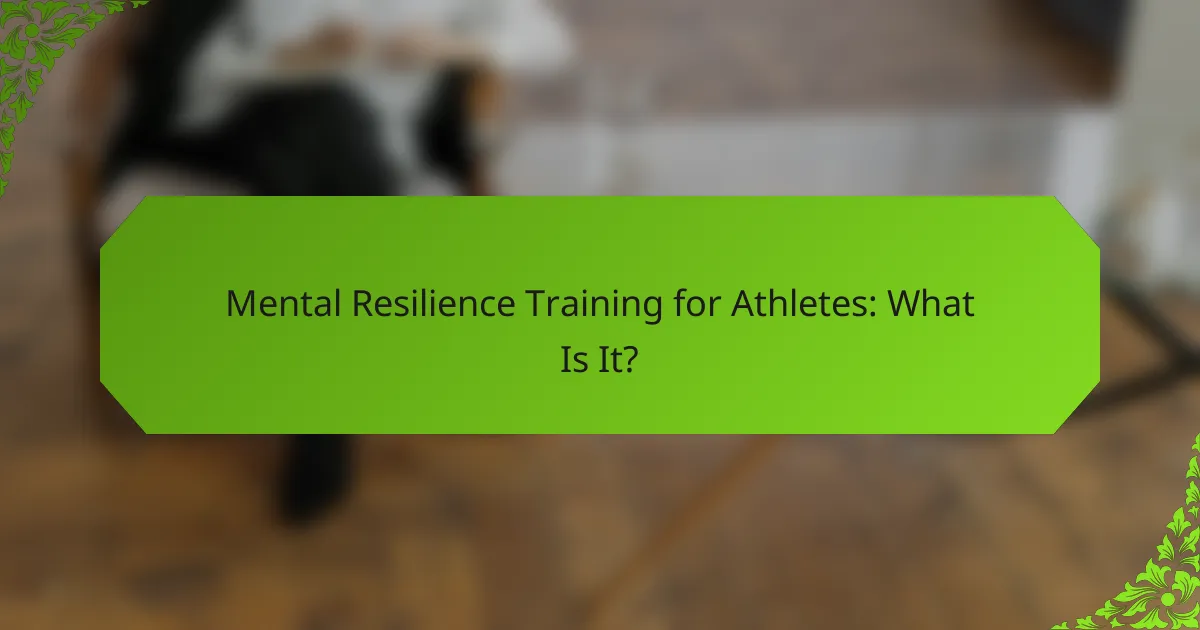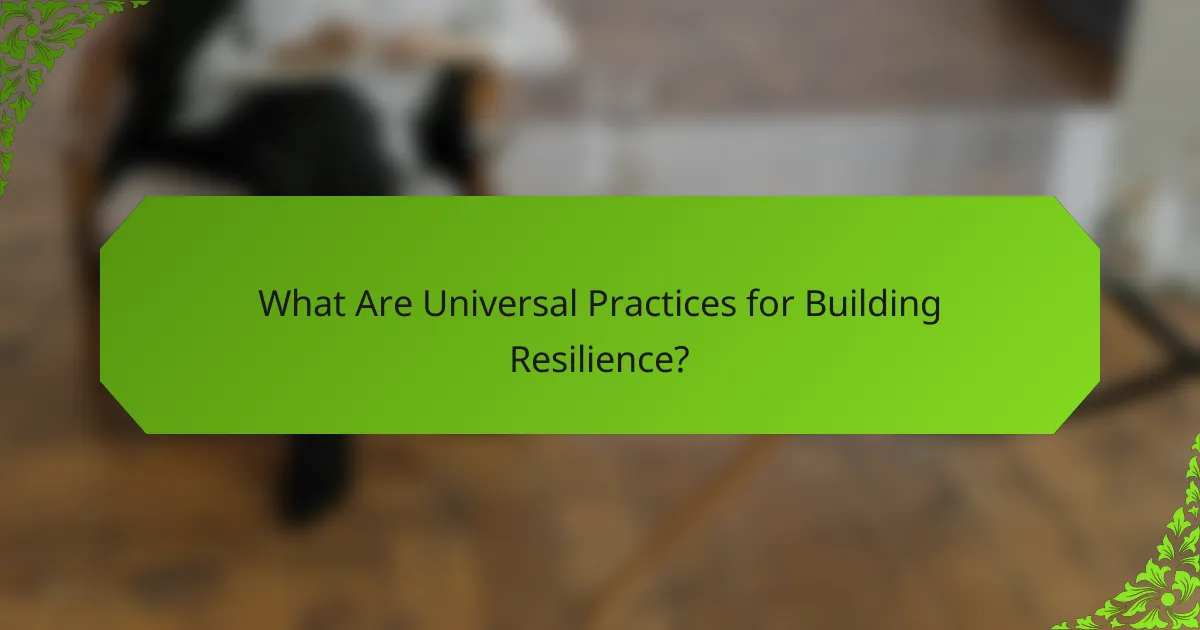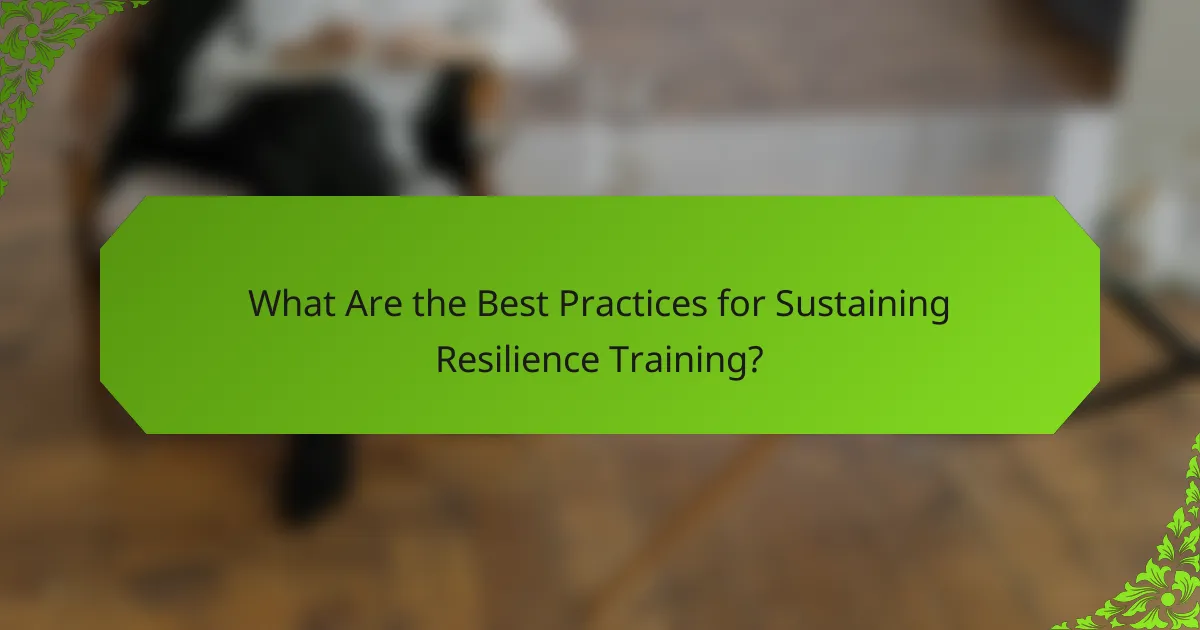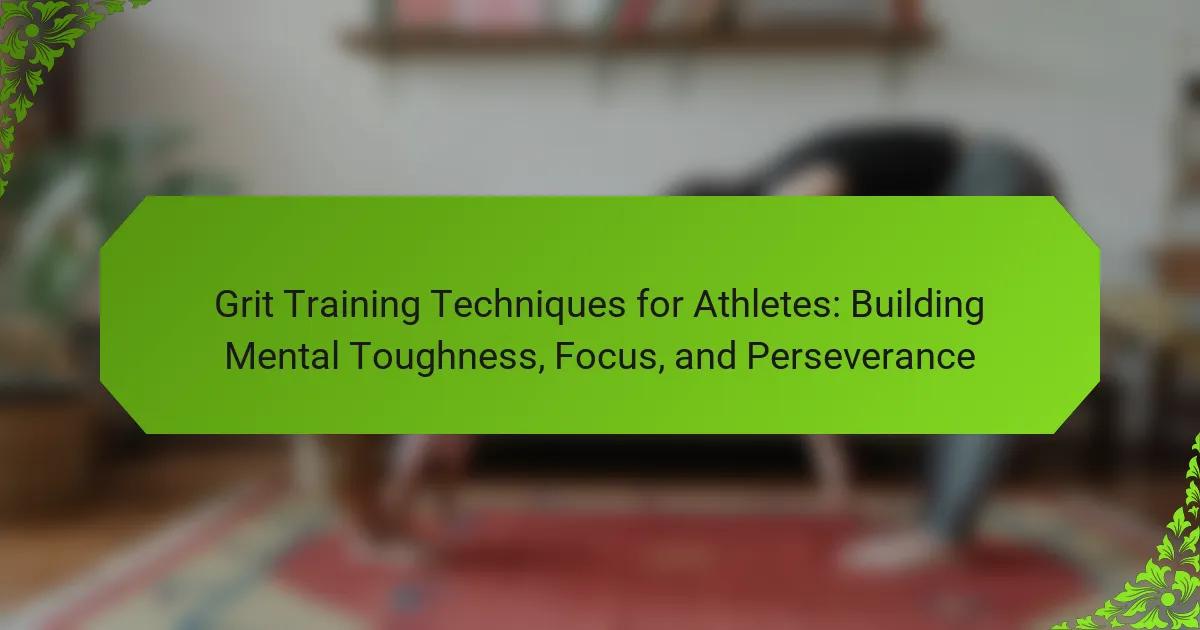Mental resilience training for athletes enhances performance by developing mental toughness and focus. This training includes goal setting, visualization, and mindfulness techniques to foster grit and determination. Athletes learn to manage stress, overcome self-doubt, and navigate pressure, ultimately improving their ability to recover from setbacks. Consistent practice and a supportive environment are crucial for sustaining resilience and achieving performance goals.

Mental Resilience Training for Athletes: What Is It?
Mental resilience training for athletes focuses on developing mental toughness to enhance performance. It equips athletes with strategies to manage stress, maintain focus, and overcome challenges. Training often includes techniques like visualization, mindfulness, and goal setting, which foster grit and determination. Research indicates that athletes who engage in mental resilience training show improved performance under pressure, enhancing their ability to recover from setbacks. This training is essential in competitive sports, where mental fortitude can distinguish success from failure.
Why Is Mental Resilience Important for Amateur Athletes?
Mental resilience is crucial for amateur athletes as it enhances performance and recovery. It helps athletes manage stress, maintain focus, and stay motivated during challenges. Building mental resilience fosters grit, enabling athletes to push through setbacks and improve overall performance. Studies show that athletes with strong mental resilience are more likely to achieve their goals and sustain long-term engagement in their sport.
What Are the Key Components of Grit?
Grit comprises passion, perseverance, and resilience, crucial for athletes in overcoming challenges. Passion fuels sustained effort towards long-term goals, while perseverance drives consistent action despite difficulties. Resilience enables recovery from setbacks, fostering mental toughness essential in competitive environments. Together, these components build a robust framework for mental resilience training, enhancing an athlete’s ability to focus and thrive under pressure.
How Do Passion and Perseverance Contribute to Grit?
Passion and perseverance are essential components of grit, significantly enhancing mental resilience in athletes. Passion fuels motivation and commitment, while perseverance ensures sustained effort despite challenges. Together, they foster a mindset that embraces adversity as a pathway to growth. Research shows that athletes with high levels of grit are more likely to achieve long-term success and maintain focus during demanding training. Cultivating these traits through targeted mental resilience training can lead to improved performance and the ability to overcome setbacks effectively.
What Role Does Focus Play in Athletic Performance?
Focus significantly enhances athletic performance by improving concentration and decision-making under pressure. Mental resilience training cultivates this focus, enabling athletes to maintain composure during challenging situations. Research indicates that athletes with strong focus can better manage distractions, leading to improved execution of skills and strategies. Furthermore, developing focus contributes to building grit, which empowers athletes to persist through adversity. By prioritising mental training, athletes can elevate their performance and achieve their goals more effectively.

What Are Universal Practices for Building Resilience?
Mental resilience training for athletes involves consistent practices that enhance grit, focus, and the ability to overcome adversity. Key universal practices include setting specific goals, developing a positive mindset, and engaging in regular mental conditioning exercises.
Goal setting helps athletes maintain motivation and direction. A positive mindset fosters resilience by encouraging athletes to view challenges as opportunities for growth. Mental conditioning exercises, such as visualization and mindfulness, improve focus and emotional regulation.
Additionally, building a support network provides athletes with encouragement and shared experiences, which can enhance resilience. Regular reflection on performance and experiences allows athletes to learn from setbacks and adapt strategies effectively.
Implementing these practices consistently leads to improved mental resilience, enabling athletes to thrive in high-pressure situations and achieve their performance goals.
How Can Visualization Techniques Enhance Mental Toughness?
Visualization techniques enhance mental toughness by improving focus, reducing anxiety, and fostering resilience in athletes. These techniques allow athletes to mentally rehearse scenarios, which builds confidence and prepares them for challenges. Research shows that athletes who regularly use visualization report increased performance and a stronger ability to cope with adversity. Engaging in this practice can lead to a unique attribute of enhanced grit, as athletes visualize overcoming obstacles and achieving their goals.
What Strategies Help in Setting Achievable Goals?
Setting achievable goals involves strategies that enhance mental resilience. Focus on specific, measurable, attainable, relevant, and time-bound (SMART) goals. Break larger objectives into smaller tasks to maintain motivation. Regularly visualize success to strengthen commitment. Employ positive self-talk to counter negative thoughts. Seek feedback and adjust goals as necessary to stay aligned with progress.
How to Break Down Goals into Manageable Steps?
To break down goals into manageable steps, start by defining specific, measurable objectives. Next, prioritise tasks based on urgency and importance. Then, create a timeline for each step, ensuring it’s realistic. Finally, regularly assess progress and adjust strategies as needed to maintain motivation and focus.
What Is the Role of Positive Self-Talk in Resilience?
Positive self-talk enhances resilience by fostering a growth mindset and promoting confidence. It helps athletes reframe challenges as opportunities for growth. Research indicates that positive self-talk can improve performance under pressure, enabling better focus and grit. This mental strategy is crucial for overcoming adversity, as it cultivates a supportive internal dialogue. Embracing positive self-talk can lead to increased motivation and perseverance, essential attributes for athletes striving for excellence.

What Unique Approaches Can Enhance Grit in Amateur Athletes?
Unique approaches to enhance grit in amateur athletes include goal-setting, mental imagery, and mindfulness practices. Goal-setting fosters a clear vision, helping athletes track progress and maintain motivation. Mental imagery allows athletes to visualize success, enhancing focus and resilience during challenging situations. Mindfulness practices cultivate self-awareness and emotional regulation, enabling athletes to manage stress and setbacks effectively. These strategies collectively build mental resilience, essential for overcoming adversity in sports.
How Can Journaling Foster Reflection and Growth?
Journaling enhances reflection and growth by promoting self-awareness and emotional processing. This practice allows athletes to articulate experiences and emotions, fostering mental resilience. Regular entries can reveal patterns in thoughts and behaviours, enabling athletes to identify areas for improvement. Additionally, journaling serves as a tool for goal-setting, helping athletes track progress and maintain focus during training.
What Is the Impact of Group Support on Mental Resilience?
Group support significantly enhances mental resilience by fostering a sense of belonging and shared experience. Athletes benefit from collective encouragement, which helps them manage stress and improve focus. Research indicates that teams with strong support systems exhibit greater grit and persistence in the face of adversity. This unique attribute of group dynamics not only boosts individual performance but also cultivates a culture of resilience, essential for overcoming challenges in competitive environments.
How to Create an Accountability Partnership?
To create an accountability partnership, identify a reliable partner who shares similar goals. Establish clear expectations regarding communication, support, and commitment. Schedule regular check-ins to discuss progress and challenges. Encourage honest feedback to foster growth and maintain motivation.

What Rare Techniques Are Used by Elite Athletes?
Elite athletes utilise rare techniques in mental resilience training to enhance grit, focus, and overcome adversity. One such technique involves visualization, where athletes mentally rehearse their performance to build confidence and reduce anxiety. Another is mindfulness meditation, which improves concentration and emotional regulation. Additionally, cognitive restructuring helps athletes challenge negative thoughts, fostering a positive mindset. These methods are not widely practised but are crucial for achieving peak performance under pressure.
How Can Meditation Practices Improve Focus?
Meditation practices can significantly enhance focus by training the mind to concentrate on the present moment. This mental discipline improves attention span and reduces distractions. Research indicates that regular meditation increases grey matter density in areas of the brain associated with attention and self-regulation. Athletes who incorporate meditation into their training report improved mental clarity and resilience, enabling them to perform under pressure. This unique attribute of meditation makes it an essential tool for building mental resilience and overcoming adversity in sports.
What Unique Breathing Techniques Are Effective for Stress Management?
Unique breathing techniques for stress management include diaphragmatic breathing, box breathing, and 4-7-8 breathing. These methods enhance mental resilience by promoting relaxation and focus. Diaphragmatic breathing engages the diaphragm, reducing anxiety and improving oxygen flow. Box breathing, a structured method, involves inhaling, holding, exhaling, and holding again for equal counts, fostering concentration. The 4-7-8 technique, where one inhales for four seconds, holds for seven, and exhales for eight, helps calm the nervous system. Each technique effectively builds grit and focus in athletes, aiding them in overcoming adversity.

What Are Common Challenges Amateur Athletes Face in Building Resilience?
Amateur athletes commonly face challenges like self-doubt, lack of mental strategies, and pressure to perform, which hinder resilience. Building mental resilience involves overcoming these obstacles through targeted training and support.
Self-doubt often arises from comparing performance with others, leading to diminished confidence. Developing a growth mindset can counteract this by focusing on personal progress rather than external comparisons.
Lack of mental strategies, such as visualization and mindfulness, can limit an athlete’s ability to cope with stress. Training in these techniques enhances focus and prepares them for competitive scenarios.
Pressure to perform can create anxiety, affecting overall performance. Learning to manage this pressure through relaxation techniques and positive self-talk fosters resilience and grit.
Building mental resilience is essential for amateur athletes to navigate challenges effectively, ensuring sustained progress and enjoyment in their sport.
How Can Athletes Overcome Fear of Failure?
Athletes can overcome fear of failure through mental resilience training. This training cultivates grit and focus, enabling athletes to face challenges confidently. Techniques such as visualization, goal setting, and mindfulness help athletes reframe their mindset. Research shows that athletes who engage in mental resilience training report lower anxiety levels and improved performance. Building a support network also enhances resilience, providing encouragement during tough times.
What Strategies Help Manage Performance Anxiety?
To manage performance anxiety, athletes can employ several strategies. Mental resilience training enhances focus, builds grit, and helps overcome adversity. Techniques include visualization, positive self-talk, and controlled breathing. These methods allow athletes to shift their mindset and reduce anxiety levels effectively. Additionally, regular practice of mindfulness can improve emotional regulation and increase overall performance under pressure.

What Are the Best Practices for Sustaining Resilience Training?
To sustain resilience training for athletes, focus on consistent practice, goal setting, and mental conditioning. Regularly engage in exercises that challenge mental toughness and adaptability. Incorporate visualization techniques to enhance focus and grit. Monitor progress through reflective journaling to identify areas of improvement. Establish a supportive environment that fosters open communication and encouragement among peers.
How to Incorporate Mental Resilience Training into Daily Routines?
Incorporating mental resilience training into daily routines enhances athletes’ grit and focus. Start by setting specific, achievable goals that align with training sessions. Integrate visualization techniques before workouts to prepare mentally. Schedule regular mindfulness practices, such as meditation or breathing exercises, to foster emotional regulation. Encourage reflection on challenges faced during training, promoting a growth mindset. Finally, maintain a supportive environment by sharing experiences with teammates, reinforcing collective resilience.
What Common Mistakes Should Athletes Avoid?
Athletes should avoid common mistakes that hinder mental resilience, such as neglecting mental training, setting unrealistic goals, and failing to manage stress. Prioritising mental practice enhances focus and grit. Additionally, overlooking recovery and support systems can lead to burnout. Building a strong mental framework is essential for overcoming adversity.
How Can Coaches Support Athletes in Developing Grit?
Coaches can significantly enhance athletes’ grit through targeted mental resilience training. They should implement strategies that foster perseverance and focus, enabling athletes to overcome challenges effectively.
One effective approach is setting incremental goals, which helps athletes build confidence and resilience over time. Coaches can also encourage a growth mindset, emphasising that effort and learning from failures are vital for development. Regular feedback, both positive and constructive, reinforces progress and motivates athletes to persist through adversity.
Additionally, incorporating mindfulness practices can enhance athletes’ focus and emotional regulation. By teaching athletes to manage stress and stay present, coaches can help them maintain composure in high-pressure situations.
Lastly, facilitating team-building exercises fosters a supportive environment, allowing athletes to share experiences and develop a collective grit. This sense of community can strengthen individual resolve and enhance overall performance.



